‘Drama. Competition. Fear’: Those lucky red envelopes for the Lunar New Year yield much more than cash
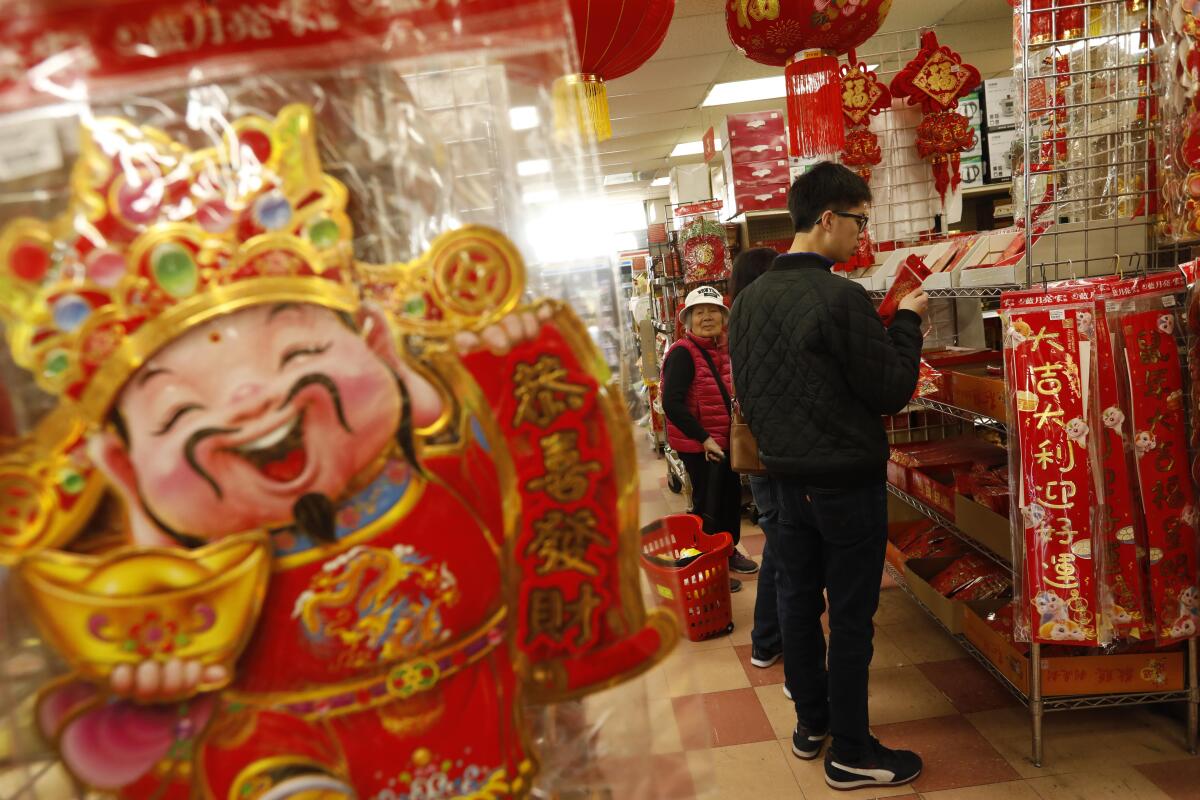
Until she’s married, Alice Liu expects to welcome the Lunar New Year counting the treasured crispy bills she receives from older relatives to mark the red-gold, multigenerational festivities.
“How much we get depends on how close we are to the giver,” said the 27-year-old from Chino Hills. “And it’s a dance.”
That’s because when younger folks gather around their elders to share wishes for good health, before they receive bountiful gifts of cash -- a venerable Asian tradition known as red packets or red envelopes -- the proper response “is to be humble, to refuse,” Liu said.
“Do our parents and grandparents accept? Of course not. But you play around while deep down, we all want the money,” Liu added, laughing. The funds could come in handy as she searches for a job.
Of all the traditions surrounding the biggest holiday in many Asian communities -- from cleaning the house and wearing new clothes for a fresh start, to lighting firecrackers to chase away evil spirits -- it may be the ubiquitous “hongbao,” as it’s called in Chinese, or “li xi,” as it’s known in Vietnamese, that inspires the most talk with endless comparisons over which relatives are big spenders and which are tightwads.
“Drama. Competition. Fear. The exchange of lucky money can involve all of these things. It’s like a soap opera that you can’t remove yourself from,” said John Tu, a businessman from Diamond Bar, in between sips of espresso at the sleek Atlantic Times Square, a development fusing shops and residential living in the heart of Monterey Park.
In anticipation of the Year of the Rat, dawning Saturday, he reflected on meeting people “who literally go into debt to meet all the financial obligations” that this season requires.
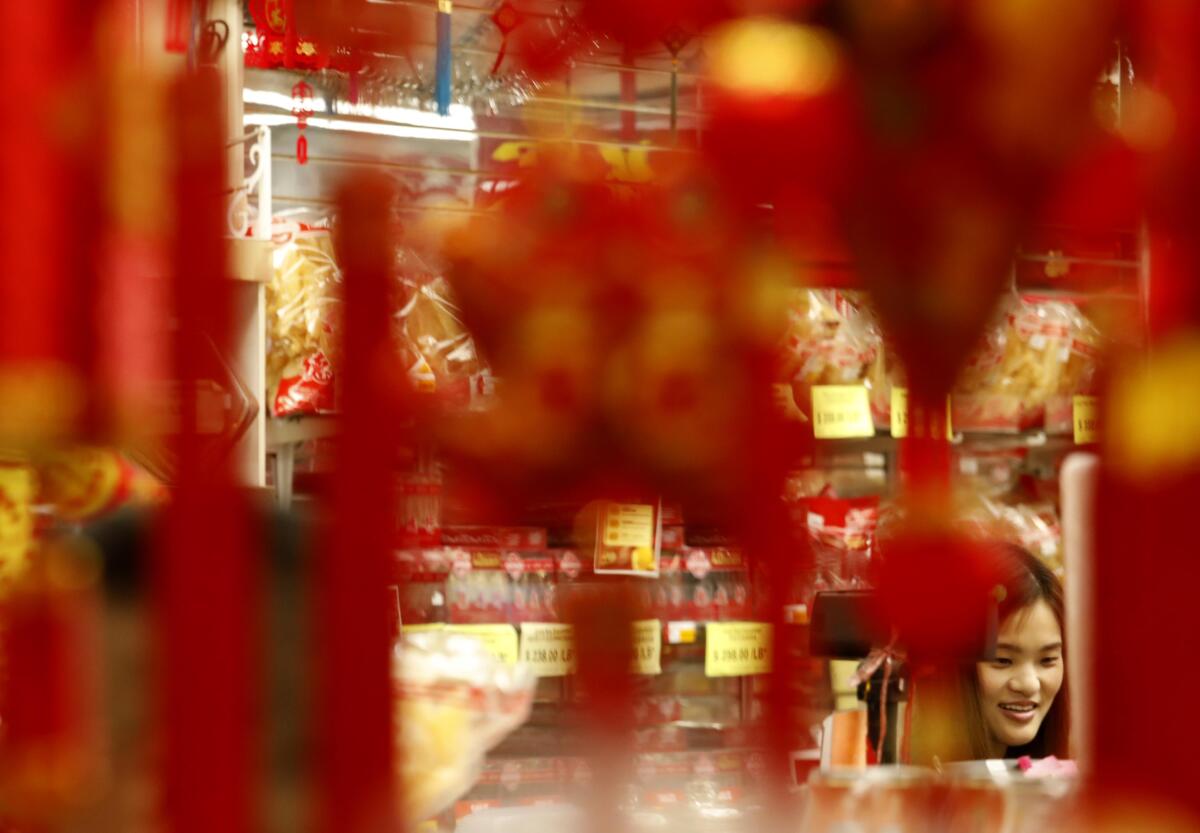
“The pressure is constant. You need to go all out and wine and dine the extended family -- not to mention these envelope gifts,” he continued. “And you should see when the youngsters open them. They’re shouting: ‘What did you get? Look what I got!’ They can’t help but brag and compare.”
Experts worry that the ancient custom has lost meaning. A tradition that began with modest, symbolic amounts tucked into envelopes has grown over the top, requiring spending huge sums under a sense of obligation. Meanwhile, the pool of people benefiting from the largesse has grown beyond immediate family members to the occasional mailman or trash collector.
“In the early days in Vietnam, the envelopes didn’t have much money because people were poorer and often, only the men of the family went to work. In modern postwar times, with more jobs, more financial benefits, families can be more generous and they feel they must pass on the tradition so that the younger generation will continue it when it’s their turn,” said Kim Dzung Pham, senior lecturer in the foreign languages department at UC Riverside.
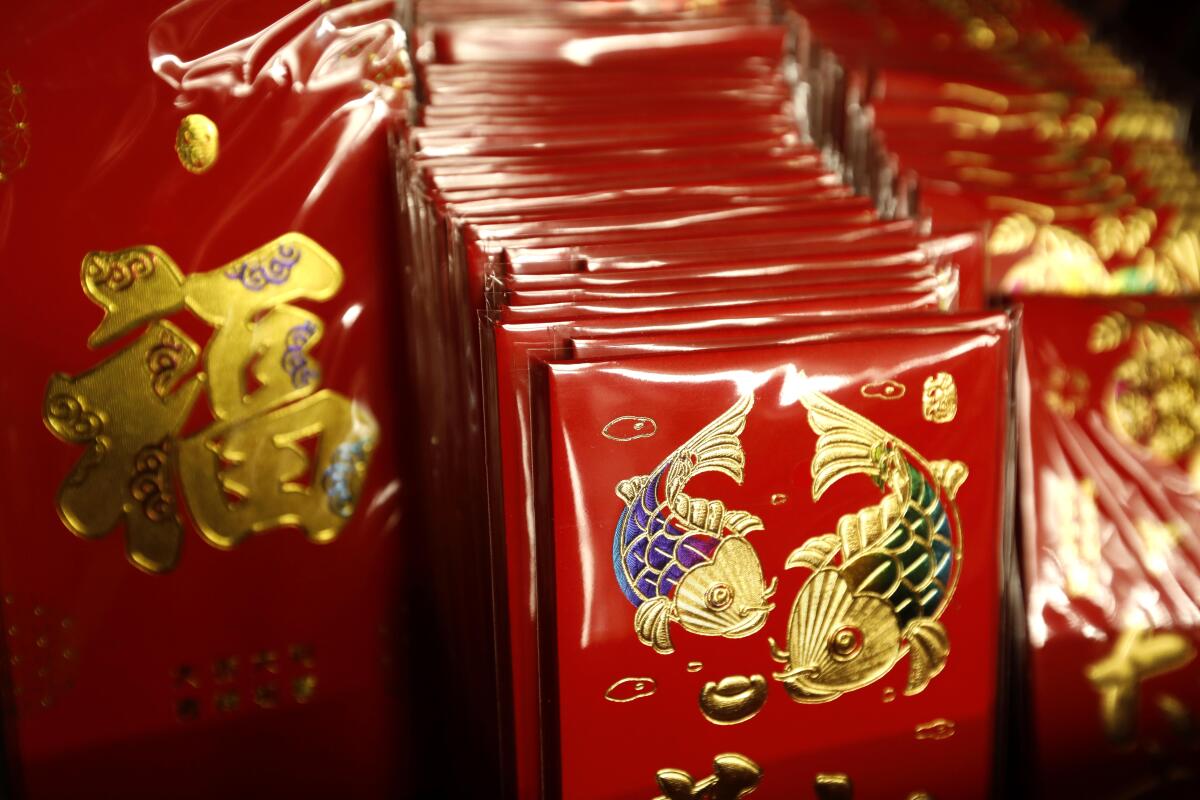
Her practice is to give to “the best of my ability,” yet she finds it “unfair” having to hand out another round of cash when one has just given the first round to the same recipients at Christmas. “Wouldn’t it be more reasonable to donate the money to nonprofit groups?”
But the politics of the red packet are so intense that they can force some people to scrimp or to strategize -- at once eager to do it right or to find a way around the restrictions.
Many would agree that the main issue is how much to give. As the new year nears, community banks report a run on the popular $2 bills that are staples in gifts going to acquaintances, co-workers or to combine in multiples to leave behind as tips.
Still, questions remain: Is giving $10 too little? Is $50 too much?
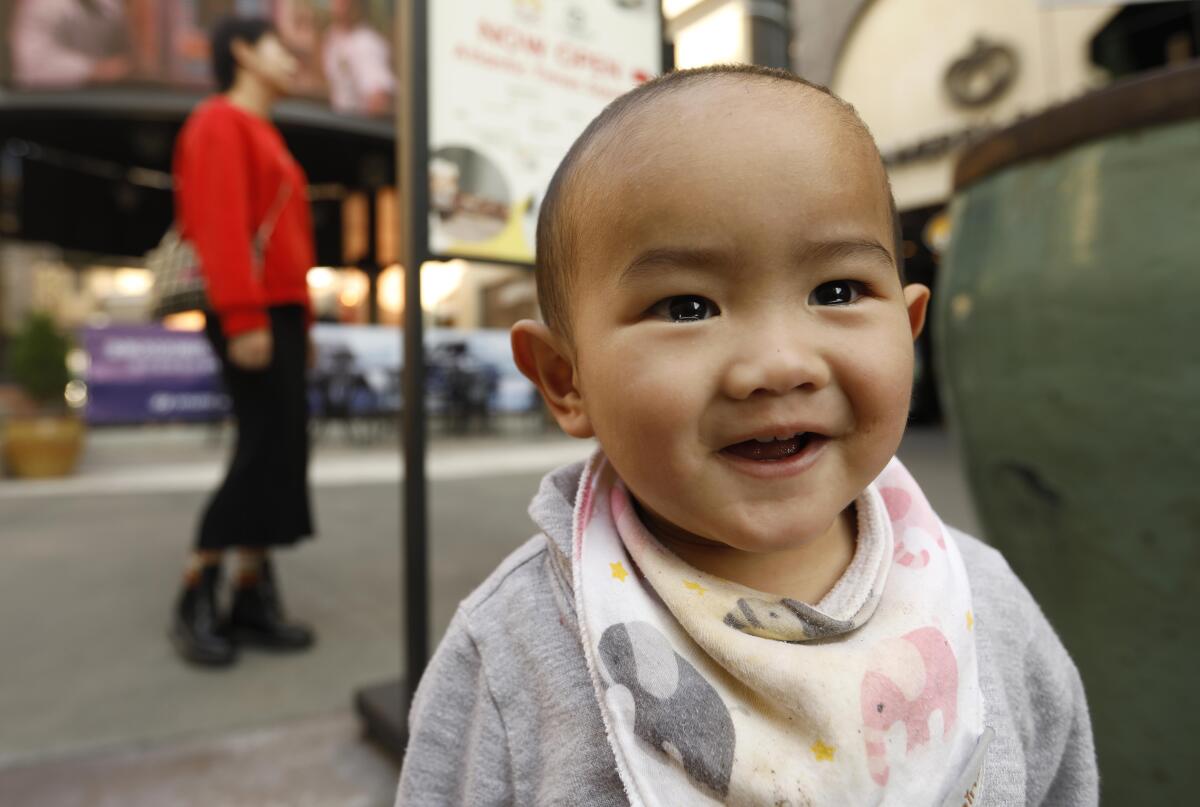
Judy Liao, a cashier at Chengdu Taste restaurant in Alhambra, said she believes that $20 is the average. That’s what she has designated for young relatives or the children of her friends. Netting such money usually ends with marriage, when those who receive transition into those who give.
For her own kids, each will open a gleaming envelope to find $100. A mere $50 for her son or her daughter “is not very enough. Maybe he thinks toys will be better,” she said, cradling 15-month-old Ethan. But, she added: “I must save. This is tradition. I do not skip.”
In fact, after toiling for months, she has set aside $3,000 for the Lunar New Year, intending to honor both her mother and mother-in-law with $500. Liao and others stressed that presenting a “correct” sum to the matriarchs and patriarchs of the family is a top priority. Once in a while, they even hand over the dollars early in case grandmas and grandpas are short of cash and need to re-gift it.
Born in Hunan, China, Liao said if she were celebrating at home, she would choose to dole out something like 168 Chinese yuan, equal to just over $24, since it contains auspicious numbers.
Jay Yang said he would “make a big deal if I were back in Taiwan.” To the fortysomething hairstylist from West Hollywood, “this holiday is not as loud or as visible here in the U.S. The atmosphere isn’t the same, but I can appreciate that people try.
“What’s important is it’s about love for one another. Even my mother still gives me a little money to bring good luck.”
That cultural concept of good luck has compelled mainstream brands to try to cash in on the action, with Nike recently premiering its first-ever Lunar New Year ad. It shows a girl who’s been told by her mother not to take “hongbao,” much to the dismay of a crafty aunt who conspires to outsmart her. As the child ages, trying to deny the dollars turns into an annual showdown against her elder.
Greeting this holiday -- on the heels of Thanksgiving, Christmas, and New Year’s -- then having to head into Valentine’s Day means that consumers never stop spending, some say.
That’s why Eric Chang, a photographer from Glendale, is careful to keep to a ritual of saving what’s inside his red envelopes in a separate account stashed in his native country, Taiwan.
Already, he worries about the future when he gets hitched and is required to start giving red envelopes. He envisions opting for the “safety of my finances” over culture. “There’s so much pressure. I think I will just take my kids out to buy some candy.”
In certain families, the politics surrounding the holiday can become so volatile that members stop speaking to each other -- sometimes permanently.
About a decade ago, Tony Lee, now in his late 30s, happened to skip observing the holiday, choosing to go camping with college buddies instead. Shocked, his mom accused the Rosemead writer of being disrespectful. His dad angrily asked why he didn’t prepare the envelopes ahead of time “so that your brother and sister and cousins’ kids weren’t left empty-handed.”
“I am the firstborn and my grandfather was very old,” Lee explained as he stocked up on holiday sweets and pears at Tak Shing Hong, a neighborhood market in Monterey Park. “It turned out to be his last celebration. My parents thought I was irresponsible since I can go to Mexico any time of the year -- but why at the new year?”
For many months Lee, who is Korean-Chinese American, stopped being invited to family reunions. But this weekend he fully plans “to be present” to “mingle among the generations,” he said. “You don’t want to be the black sheep. You need to rise to the occasion.”
And then there are rivalries.
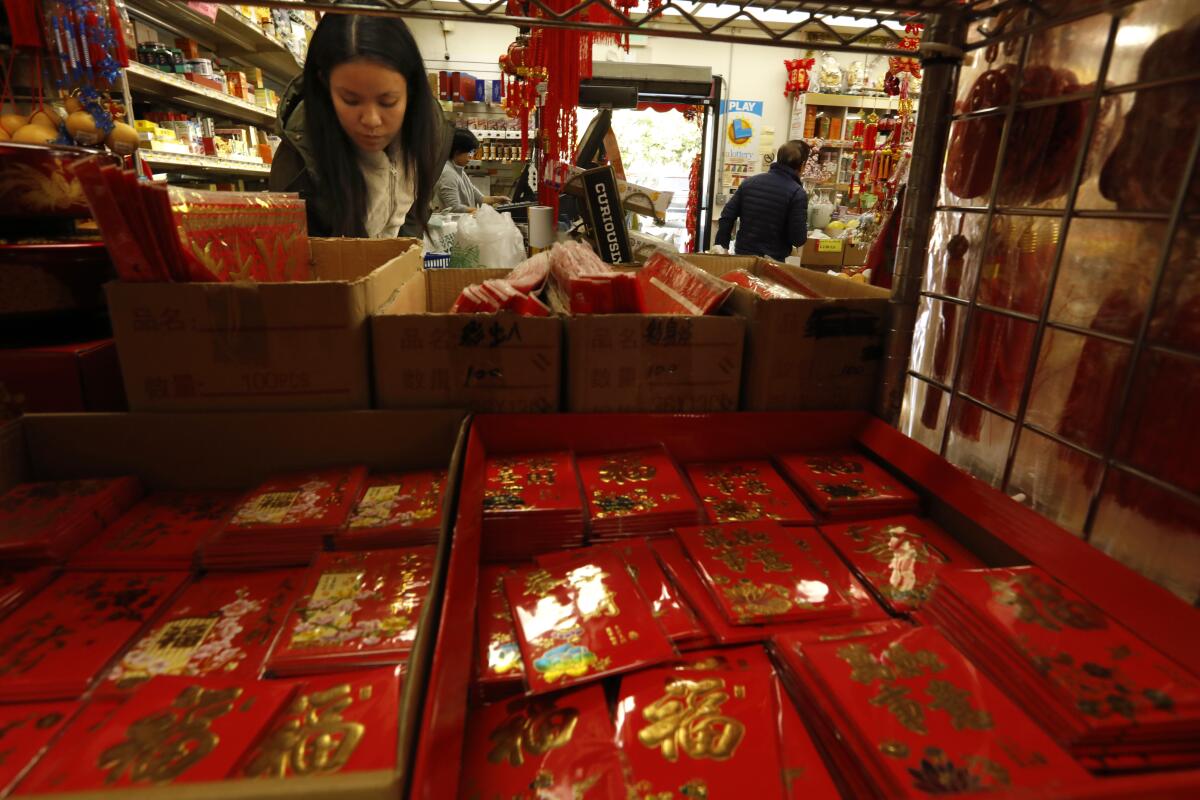
Joe Huang has always paled in comparison to his older brother, who’s a doctor. “I’m only an engineer,” the 42-year-old Arcadia resident said wistfully, “not having the big bucks and not the fancy medical school. That’s why I have to spend way more.”
He brings lunch to work during the months of November and December so that when the new year unfolds, he can afford to dole out at least $100 to all the nieces and nephews, including his sibling’s three kids. “I make sure to save the $200 for the ones in college.”
Lisa Dao, 39, of Los Angeles recounted how at first her Caucasian husband was befuddled by the tradition. The two, who met in Houston, annually set aside $1,500 to $2,000. “He didn’t understand why we had to spend so much and why we had to give to so many.”
In her husband’s family, wads of cash were associated with lottery winnings or gambling. For Christmas, relatives drew names and weren’t required to shop for gifts for multiple generations. In Dao’s circle, however, as the oldest of four, the Vietnamese American office manager is expected to set a strong example and follow cultural norms.
“I already disappointed the parents by marrying outside the culture. The least I could do is to shell out the money,” she said.
“The Asians are very strict about doing things for the sake of appearance,” added her husband, Tim Harper. “Save face, save face -- that’s what it’s all about. They do their utmost to preserve the reputation, and while I respect many customs, I can’t always be completely supportive.
“To me, it’s a lot of money that can be better kept in a mutual fund or used for home improvements.”
More to Read
Start your day right
Sign up for Essential California for news, features and recommendations from the L.A. Times and beyond in your inbox six days a week.
You may occasionally receive promotional content from the Los Angeles Times.







